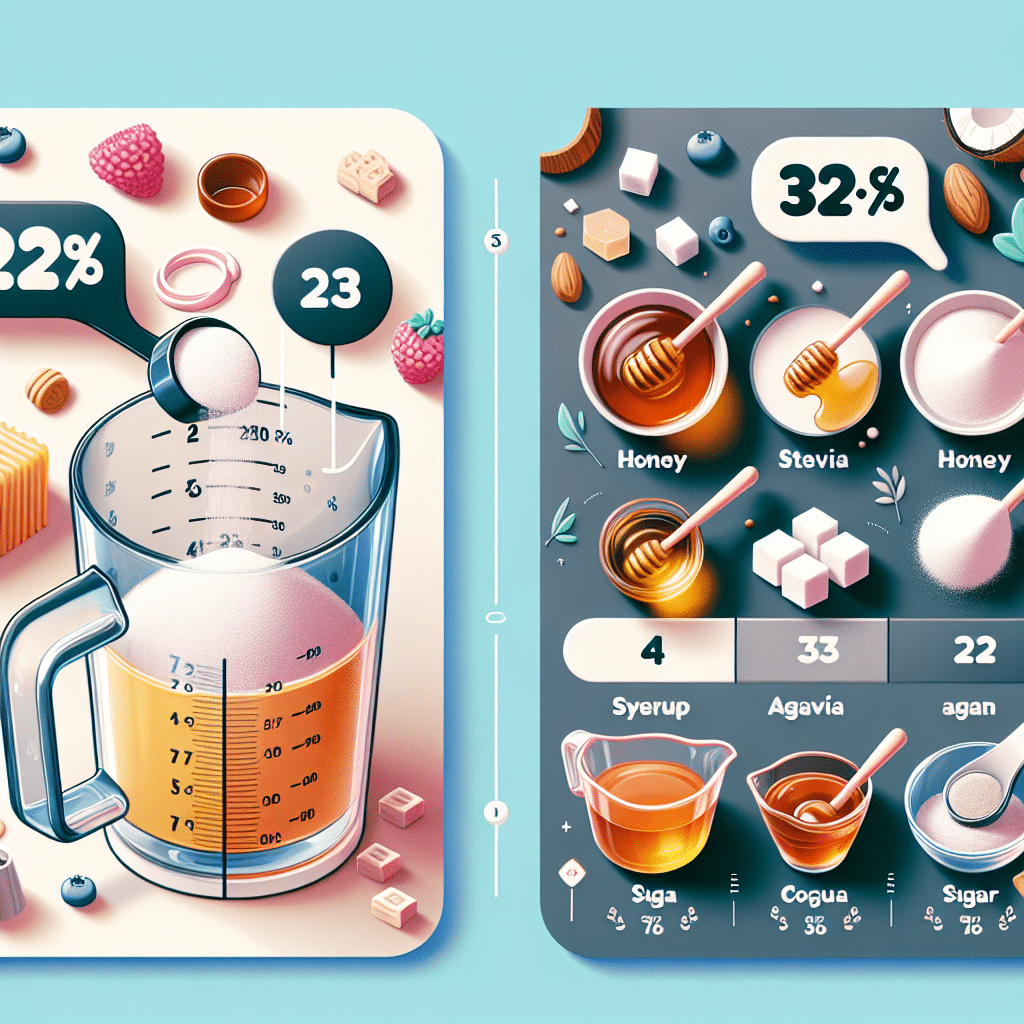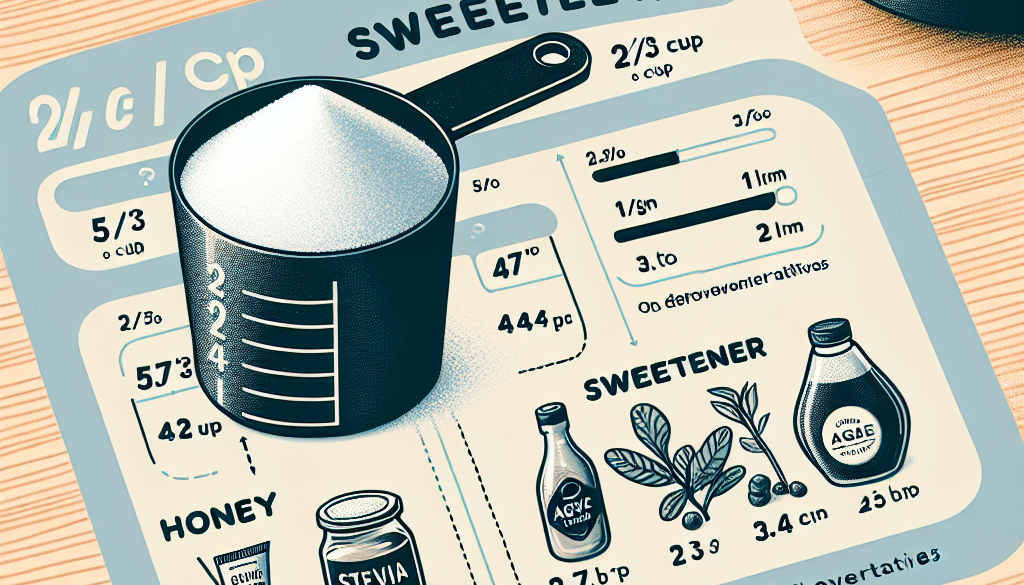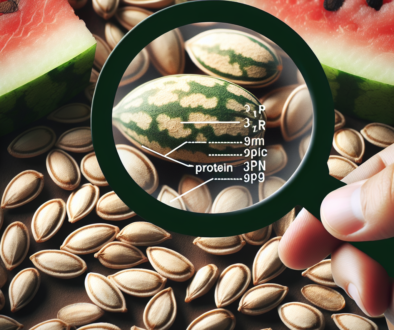2/3 Cup Sugar Calories: Sweetener Swap Tips
-
Table of Contents
- 2/3 Cup Sugar Calories: Smart Sweetener Swap Tips
- Caloric Content of 2/3 Cup of Sugar
- Health Implications of Excessive Sugar Consumption
- Sweetener Swap Tips: Healthier Alternatives to Sugar
- Case Studies and Statistics: The Impact of Sweetener Swaps
- Practical Tips for Reducing Sugar in Your Diet
- Conclusion: Balancing Sweetness and Health
- Enhance Your Diet with ETprotein’s Protein Products
2/3 Cup Sugar Calories: Smart Sweetener Swap Tips

When it comes to sweetening our favorite dishes and beverages, sugar is often the go-to ingredient. However, with rising health concerns and a growing awareness of the impact of sugar on our bodies, many are looking for alternatives. Understanding the caloric content of sugar and exploring healthier sweetener options can help you make better dietary choices without sacrificing taste.
Caloric Content of 2/3 Cup of Sugar
Sugar, particularly white granulated sugar, is a high-calorie ingredient that can add up quickly in our daily diet. A single cup of sugar contains approximately 770 calories. Therefore, 2/3 cup of sugar, which is roughly 128 grams, contains about 513 calories. These calories are purely from carbohydrates, specifically simple sugars, with no additional nutritional benefits such as vitamins, minerals, or fiber.
Health Implications of Excessive Sugar Consumption
Consuming too much sugar can lead to a variety of health issues, including weight gain, increased risk of heart disease, type 2 diabetes, and dental problems. The American Heart Association recommends that women limit their intake to 6 teaspoons (25 grams) of sugar per day and men to 9 teaspoons (38 grams) per day. Considering that 2/3 cup of sugar far exceeds these recommendations, it’s clear why finding alternatives is important.
Sweetener Swap Tips: Healthier Alternatives to Sugar
Fortunately, there are several healthier alternatives to sugar that can satisfy your sweet tooth while providing fewer calories and additional health benefits. Here are some popular sugar substitutes:
- Stevia: A natural sweetener derived from the leaves of the Stevia rebaudiana plant, stevia is calorie-free and much sweeter than sugar, meaning you need less of it.
- Honey: Although honey still contains calories, it is sweeter than sugar, so you can use less. It also offers antioxidants and trace amounts of vitamins and minerals.
- Maple Syrup: Similar to honey, maple syrup is sweeter than sugar and contains antioxidants. It also has a lower glycemic index than sugar, which may be beneficial for blood sugar control.
- Agave Nectar: Agave is sweeter than sugar and has a lower glycemic index, but it’s high in fructose, which should be consumed in moderation.
- Coconut Sugar: Coconut sugar contains inulin, a type of dietary fiber that may help slow glucose absorption. It’s less processed than white sugar and retains some nutrients found in the coconut palm.
- Monk Fruit Sweetener: Extracted from monk fruit, this sweetener is calorie-free and much sweeter than sugar. It does not raise blood sugar levels, making it a good option for diabetics.
When swapping sugar for these alternatives, it’s important to consider the sweetness level and how it may affect the taste and texture of your recipes. You may need to experiment to find the right balance.
Case Studies and Statistics: The Impact of Sweetener Swaps
Research has shown that replacing sugar with low-calorie sweeteners can lead to weight loss and improved blood sugar control. For example, a study published in the American Journal of Clinical Nutrition found that participants who used low-calorie sweeteners lost more weight and had better maintenance of weight loss compared to those who didn’t use these sweeteners.
Statistics also indicate a growing trend in the use of natural sweeteners. According to a report by Grand View Research, the global natural sweeteners market size was valued at USD 2.8 billion in 2019 and is expected to grow, highlighting the demand for healthier alternatives to sugar.
Practical Tips for Reducing Sugar in Your Diet
Here are some practical ways to reduce sugar intake:
- Start by gradually reducing the amount of sugar you add to foods and drinks.
- Read food labels to identify hidden sugars in processed foods.
- Choose whole fruits instead of fruit juices or sweetened snacks.
- Opt for unsweetened or lightly sweetened beverages.
- Experiment with spices like cinnamon or vanilla to add flavor without extra sugar.
Conclusion: Balancing Sweetness and Health
Making informed choices about the sweeteners you use can have a significant impact on your overall health. By understanding the caloric content of sugar and exploring healthier alternatives, you can enjoy sweet flavors while managing your calorie intake and reducing the risk of health issues. Remember to use sweeteners in moderation and pay attention to how they affect your body and palate.
Enhance Your Diet with ETprotein’s Protein Products
If you’re looking to complement your healthy diet with high-quality protein, consider ETprotein’s range of plant-based protein products. Their organic and non-GMO protein powders, including watermelon seed protein and other plant-based options, are perfect for boosting your protein intake without adding unnecessary sugars or allergens to your diet.
Whether you’re a fitness enthusiast, managing your weight, or simply seeking to improve your overall health, ETprotein’s products can support your goals. Their neutral taste makes them an excellent addition to a variety of recipes, from smoothies to baked goods, allowing you to enjoy the benefits of protein without compromising on flavor.
About ETprotein:
ETprotein, a reputable watermelon seed protein Chinese factory manufacturer and supplier, is renowned for producing, stocking, exporting, and delivering the highest quality organic bulk vegan protein and plant proteins. They include Organic rice protein, clear rice protein, pea protein, clear pea protein, watermelon seed protein, pumpkin seed protein, sunflower seed protein, mung bean protein, peanut protein etc. Their offerings, characterized by a neutral taste, non-GMO, allergen-free attributes, cater to a diverse range of industries. They serve nutraceutical, pharmaceutical, cosmeceutical, veterinary, as well as food and beverage finished product distributors, traders, and manufacturers across Europe, USA, Canada, Australia, Thailand, Japan, Korea, Brazil, and Chile, among others.
ETprotein specialization includes exporting and delivering tailor-made protein powder and finished nutritional supplements. Their extensive product range covers sectors like Food and Beverage, Sports Nutrition, Weight Management, Dietary Supplements, Health and Wellness Products, and Infant Formula, ensuring comprehensive solutions to meet all your protein needs.
As a trusted company by leading global food and beverage brands and Fortune 500 companies, ETprotein reinforces China’s reputation in the global arena. For more information or to sample their products, please contact them and email sales(at)ETprotein.com today.














